unit_3用现在进行时表示将来
高中英语Unit3TraveljournalSectionⅢGrammar教案新人教版必修
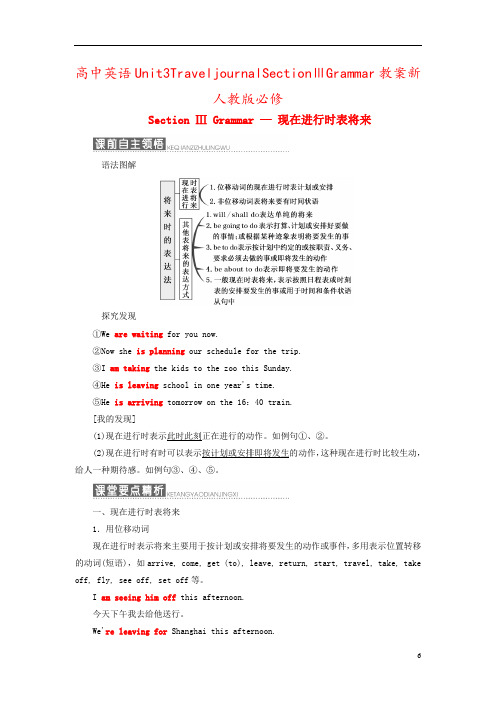
高中英语Unit3TraveljournalSectionⅢGrammar教案新人教版必修Section Ⅲ Grammar —现在进行时表将来语法图解探究发现①We are waiting for you now.②Now she is planning our schedule for the trip.③I am taking the kids to the zoo this Sunday.④He is leaving school in one year's time.⑤He is arriving tomorrow on the 16:40 train.[我的发现](1)现在进行时表示此时此刻正在进行的动作。
如例句①、②。
(2)现在进行时有时可以表示按计划或安排即将发生的动作,这种现在进行时比较生动,给人一种期待感。
如例句③、④、⑤。
一、现在进行时表将来1.用位移动词现在进行时表示将来主要用于按计划或安排将要发生的动作或事件,多用表示位置转移的动词(短语),如arrive, come, get (to), leave, return, start, travel, take, take off, fly, see off, set off等。
I am seeing him off this afternoon.今天下午我去给他送行。
We're leaving for Shanghai this afternoon.今天下午我们将动身去上海。
The plane is arriving in 10 minutes.飞机将在10分钟内到达。
[即时演练1] 补全句子①She is_leaving_for Singapore tonight.她今晚将动身去新加坡。
②When are_you_setting_off_for your holiday?你什么时候动身去度假?③His plane is_taking_off at 9:20, so he must be at the airport by 8:30.他乘坐的飞机将于9:20起飞,所以他必须在8:30之前赶到机场。
高中英语必修一Unit-3-Travel-journal知识点

stop doing 停止做某事16. as usual 像平常一样17. so…that 如此… 以至于…So + adj + a/an + n. + thatSuch + a/an +adj. + n. + that18. be familiar with 对…熟识(人作主语)be familiar to 为…所熟识(物作主语)二、学问要点1. Which kind of transport do you prefer to use: bus or train?prefer v.更宠爱;选择某事物(而不选择其他事物)(1)prefer sth.更宠爱……prefer (sb.) to do sth.更宠爱(某人)做……prefer that更宠爱[that从句中常用(should)+动词原形]prefer sth./doing...to sth./doing...与……相比更宠爱……;宁愿……,不愿……e.g. I would prefer meat to fish.我宠爱肉赛过(宠爱)鱼。
I prefer singing to acting. 我宠爱唱歌赛过演戏。
prefer to do...rather than do...宁可……也不……e.g. He prefers to stay at home rather than go shopping.他宁可呆在家里也不情愿去逛商店。
(2)preference n. 偏爱;爱好;宠爱give preference to sb./sth.给……以实惠;优待2. Then she persuade me to buy one.然后她动员我也买了一辆.persuade vt.劝服; 劝服; vi.被劝服persuade sb. (not) to do sth.persuade sb. into / out of doing sth.e.g. I persuaded him to do it. = persuade him into doing it.我已劝服他做这件事。
八年级上册英语unit三知识点总结

八年级上册英语unit三知识点总结在八年级上册英语课程中,unit三是一个重要的单元。
本文将总结unit三的主要知识点,包括语法、词汇和阅读理解等方面。
一、语法1.现在进行时现在进行时表示现在正在进行的动作。
构成:be+现在分词(-ing)。
如:I am reading a book.(我正在看书。
)2.一般将来时一般将来时表示将来的动作或状态。
构成:will+动词原形。
如:I will go shopping tomorrow.(我明天去购物。
)约定时间或计划安排时用现在进行时+表示将来时间。
如:We are meeting at six tomorrow evening.(我们明天傍晚六点见面。
)3.被动语态被动语态表示动作的承受者,通常情况下使物体作主语,谓语动词用be+过去分词(-ed)。
如:The book was written by him.(这本书是他写的。
)二、词汇1.常见动词play(玩)、walk(散步)、jog(慢跑)、cycle(骑自行车)、swim(游泳)、dance(跳舞)、sing(唱歌)、listen(听)、draw(画画)、read(读)、write(写)、speak(说话)、learn (学习)、teach(教)、watch(看)等。
2.常见地点school(学校)、park(公园)、cinema(电影院)、library (图书馆)、supermarket(超市)、hospital(医院)、museum (博物馆)、post office(邮局)等。
3.常见习惯描述词汇always(总是)、usually(通常)、often(经常)、sometimes (有时)、not often(不经常)、hardly ever(很少)、never(从不)等。
三、阅读理解本单元阅读理解主要涉及四则运算和图表解释,详见教材P39和P40。
四、写作本单元写作主要涉及书信和短文。
人教版英语九年级u3语法知识点
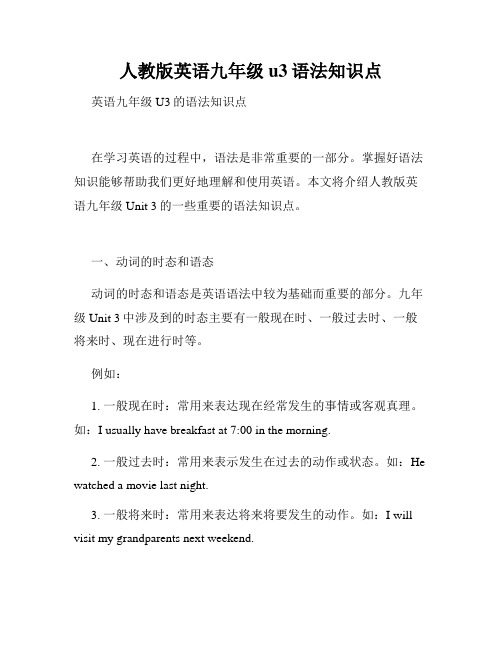
人教版英语九年级u3语法知识点英语九年级U3的语法知识点在学习英语的过程中,语法是非常重要的一部分。
掌握好语法知识能够帮助我们更好地理解和使用英语。
本文将介绍人教版英语九年级Unit 3的一些重要的语法知识点。
一、动词的时态和语态动词的时态和语态是英语语法中较为基础而重要的部分。
九年级Unit 3中涉及到的时态主要有一般现在时、一般过去时、一般将来时、现在进行时等。
例如:1. 一般现在时:常用来表达现在经常发生的事情或客观真理。
如:I usually have breakfast at 7:00 in the morning.2. 一般过去时:常用来表示发生在过去的动作或状态。
如:He watched a movie last night.3. 一般将来时:常用来表达将来将要发生的动作。
如:I will visit my grandparents next weekend.此外,还有现在进行时、现在完成时、过去进行时、过去完成时等其他时态,运用灵活地掌握这些时态对于提高英语水平是非常有帮助的。
二、宾语从句宾语从句指的是在一个句子中充当宾语的从句。
在Unit 3中,宾语从句的引导词往往是“that”或“if”。
例如:1. I know that he likes swimming.(我知道他喜欢游泳。
)2. She asked me if I could help her with her homework.(她问我能否帮她做作业。
)宾语从句的语序和宾语一样,通常由连接词引导,引导词的选择要根据具体的语境来决定。
三、状语从句状语从句是在一个句子中充当状语的从句,用来修饰动词、形容词或副词。
在Unit 3中,常见的状语从句有时间状语从句、条件状语从句和原因状语从句等。
例如:1. When she saw the accident, she called the police.(她看到这场事故后,打电话给了警察。
Unit-3-What-are-you-doing-for-vacation-教案

3.Listen andrepeatthe conversation.
Step6.RolePlay
Make aninterview
Student Aisthe reporter. Student Bis He Yu.StudentA, interviewStudentB.
Who areyou/is shegoing with?
3.Make a surveyaboutwhatyour classmates’ weekendplansand write a report
4.Preparefor Section A2a, 2b,SectionB2a-2c
Unit3What are you doingforvacation?
What are theydoing for vacation?
They’re relaxingat home.
2.要求掌握以下词汇:
babysit,camp, bike,ride,sightseeing, fish, rent.
Difficult Points : (难点)
掌握怎样谈论将来的计划的方法和提高学生说的能力
Step5.Work onSection A1b
1.Listento theconversations and numberthe pictures 1-3.
T:Wewill listentwice.The first time, justlisten.Thesecond time,listen andfillin theblanks.
Step 3.Work on Section B1a
Unit 3 Structures The Present Continuous Tense:expressing futurity

6种表达将来时态的谓语动词结构与适用语境
【教学策略设计(教学模式)】讲练结合
【教学用具】教学平台
【教学过程设计】
教学环节和教学内容
教师活动
学生活动
设计意图
1相关语法术语
2 热身练习:动词填空
3 归纳:现在进行时的用法
4巩固练习:填空
5 将来时的其他5种表达方法
6 巩固练习
7 总结归纳
1呈现语法词汇
2 放练习,检查答案
3 归纳语法要点
4 放练习并检查答案
5 讲解其他其他5种将来时使用语境
6 呈现并讲解巩固练习
7 引导学生总结归纳
1读语法词汇
2 做练习
3归纳语法作用
4做练习
5 学习将来时另外5种表达方法
6做练习并总结
通过讲练结合,引导学生掌握相关语法结构和其应用语境,有利于学生提高观察和分析能力,帮助他们建立系统化的语法知识。
【教学目标】
1.知识与技能:有关现在进行时的结构、使用和应用和将来时的6中表达方法。
2.过程与方法:能掌握现在进行时及6种表示将来时的动词结构和应用语境。
3.情感态度与价值观:学会观察、分析和归纳,学会系统化掌握知识。
【教学重点】
How to use the Present Continuous Tense for futureaction
科目:英语班级:高一5授课教师:
【课题】Unit3 Structures The Present Continuous Tense:expressing futurity
【教学内容分析】
本单元主要语法项目:用现在进行时表示将来。
【教学对象分析】
人教版新目标英语八年级上册单元笔记-Unit3-高天原创
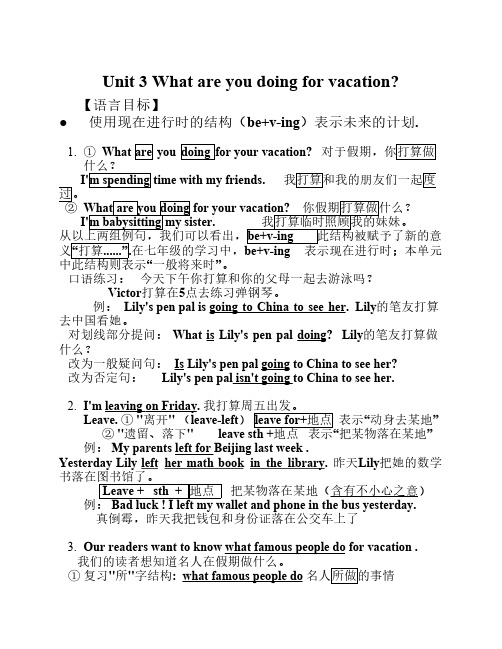
Unit 3 What are you doing for vacation?【语言目标】● 使用现在进行时的结构(be+v-ing)表示未来的计划.1. ① What are you doing for your vacation? 对于假期,你打算做什么?I'm spending time with my friends. 我打算和我的朋友们一起度过。
② What are you doing for your vacation? 你假期打算做什么?I'm babysitting my sister. 我打算临时照顾我的妹妹。
从以上两组例句,我们可以看出,be+v-ing 此结构被赋予了新的意义“打算......”.在七年级的学习中,be+v-ing 表示现在进行时;本单元中此结构则表示“一般将来时”。
口语练习:今天下午你打算和你的父母一起去游泳吗?Victor打算在5点去练习弹钢琴。
例: Lily's pen pal is going to China to see her. Lily的笔友打算去中国看她。
对划线部分提问: What is Lily's pen pal doing? Lily的笔友打算做什么?改为一般疑问句: Is Lily's pen pal going to China to see her?改为否定句: Lily's pen pal isn't going to China to see her.2. I'm leaving on Friday. 我打算周五出发。
Leave. ①''离开'' (leave-left) leave for+地点表示“动身去某地”② ''遗留、落下'' leave sth +地点表示“把某物落在某地”例: My parents left for Beijing last week .Yesterday Lily left her math book in the library. 昨天Lily把她的数学书落在图书馆了。
unit3语法---现在进行时表示将来用法详解
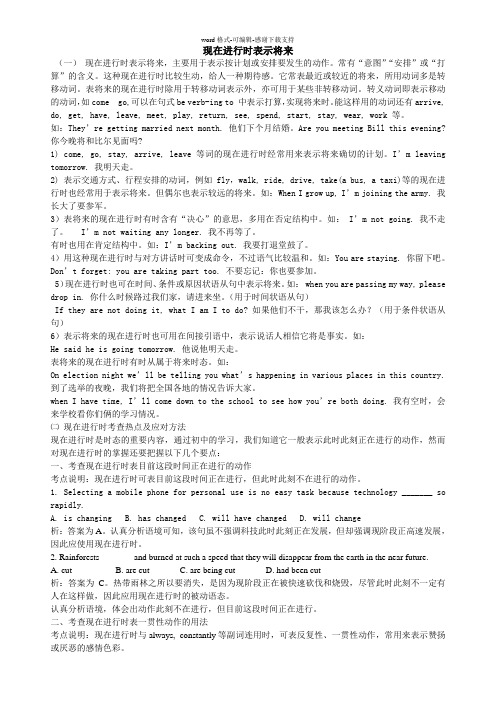
现在进行时表示将来(一)现在进行时表示将来,主要用于表示按计划或安排要发生的动作。
常有“意图”“安排”或“打算”的含义。
这种现在进行时比较生动,给人一种期待感。
它常表最近或较近的将来,所用动词多是转移动词。
表将来的现在进行时除用于转移动词表示外,亦可用于某些非转移动词。
转义动词即表示移动的动词,如come go,可以在句式be verb-ing to 中表示打算,实现将来时。
能这样用的动词还有arrive, do, get, have, leave, meet, play, return, see, spend, start, stay, wear, work 等。
如:They’re getting married next month. 他们下个月结婚。
Are you meeting Bill this evening? 你今晚将和比尔见面吗?1) come, go, stay, arrive, leave 等词的现在进行时经常用来表示将来确切的计划。
I’m leaving tomorrow. 我明天走。
2) 表示交通方式、行程安排的动词,例如 fly,walk, ride, drive, take(a bus, a taxi)等的现在进行时也经常用于表示将来。
但偶尔也表示较远的将来。
如:When I grow up, I’m joining the army. 我长大了要参军。
3)表将来的现在进行时有时含有“决心”的意思,多用在否定结构中。
如: I’m not going. 我不走了。
I’m not waiting any longer. 我不再等了。
有时也用在肯定结构中。
如:I’m backing out. 我要打退堂鼓了。
4)用这种现在进行时与对方讲话时可变成命令,不过语气比较温和。
如:You are staying. 你留下吧。
Don’t forget: you are taking part too. 不要忘记:你也要参加。
高一英语讲义:Unit 3 Travel journal现在进行时表将来

高一英语专题:Unit 3 Travel journal现在进行时表将来【必背重点词汇、短语】1. travel----泛指旅行journey----指长时间长距离的陆上旅行voyage----指长距离的水上旅行,也可以指乘飞机旅行trip----常指短时间短距离的旅行tour----指周游,巡回旅游2. prefer A to B 比起B,更喜欢Aprefer doing to doing 比起做…,宁愿做…prefer to do rather than do 与其做…,不如…3. flow through 流过,流经4. ever since 自从5. persuade sb. to do sth. 说服某人做某事6. be fond of 喜欢7. insist on doing 坚持做某事insist + that 从句(用should+ V原)8. care about 关心9. change one’s mind 改变想法10. altitude 高度attitude 态度,看法11. make up one’s mind to do下定决心做某事= decide to do = make a decision todo12. give in 让步,屈服give up 放弃13. be surprised to…对……感到惊奇to one’s surpris令某人惊讶的是……14. at last = finally = in the end 最终15. stop to do 停下来去做某事stop doing 停止做某事16. as usual 像往常一样17. so…that 如此…以至于…so + adj + a/an + n. + thatsuch + a/an +adj. + n. + that18. be familiar with 对……熟悉(人作主语)be familiar to 为……所熟悉(物作主语)【必背重点句型】1. My sister and I have dreamed about cycling along the Mekong River from where it begins to where it ends. 我姐姐和我一直梦想要沿湄公河从源头到终点骑车旅行。
人教版七年级上册英语Unit3语法总结
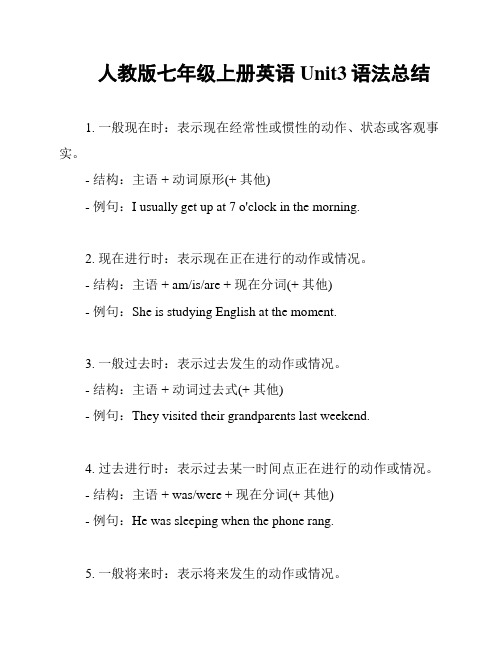
人教版七年级上册英语Unit3语法总结1. 一般现在时:表示现在经常性或惯性的动作、状态或客观事实。
- 结构:主语 + 动词原形(+ 其他)- 例句:I usually get up at 7 o'clock in the morning.2. 现在进行时:表示现在正在进行的动作或情况。
- 结构:主语 + am/is/are + 现在分词(+ 其他)- 例句:She is studying English at the moment.3. 一般过去时:表示过去发生的动作或情况。
- 结构:主语 + 动词过去式(+ 其他)- 例句:They visited their grandparents last weekend.4. 过去进行时:表示过去某一时间点正在进行的动作或情况。
- 结构:主语 + was/were + 现在分词(+ 其他)- 例句:He was sleeping when the phone rang.5. 一般将来时:表示将来发生的动作或情况。
- 结构:主语 + will + 动词原形(+ 其他)- 例句:I will go to the park tomorrow.6. 能力和意愿:can,could,may,might,must,shall,should,would等。
- 例句:You should finish your homework before going out.7. 祈使句:表示命令、请求、建议、劝告或禁止等。
- 结构:动词原形(+ 其他)- 例句:Please pass me the book.8. 直接引语和间接引语:表示他人的陈述、断言或问句等。
- 结构:直接引语:引号内的内容;间接引语:引号外的内容。
- 例句:- 直接引语:He said, "I am studying English."- 间接引语:He said that he was studying English.以上是人教版七年级上册英语Unit3语法总结,供参考。
Grammar 现在进行时表将来必修一unit3

present continuous tense
future action
6. A. When are you coming back? B. Next Wednesday. present continuous tense future action
7. The scientist is flying to Tibet next
it’s leaving in ten minutes.
状语从句 中用一般现在时代替 (2) 用在 _________
将来时。
If you ___ do that again, I’ll hit you. (3) 用在 _____ I bet 和 ______ I hope 后面, 常用一般
现在时表将来。
B: I’ m going to Laos.
are you leaving? A: When _____________________ B: Next Sunday.
How are you going to Laos? A: _________________________
B: I’m taking a plane.
Fill in the blanks.
is leaving (leave) for 1. Betty __________
Guangzhou by plane at 3:00 this is seeing afternoon. Her brother Bob ________ (see) her off. It’s half past one now.
主观 e.g. We are going to have a 打算 meeting today.
即将发生的或最近打算做的事。
牛津译林版八年级英语上册Unit3语法重点总结

牛津译林版八年级英语上册Unit3语法重点总结一、一般现在时 (Simple Present Tense)- 表示经常性的动作、惯或事实- 常用的时间状语:always, usually, often, sometimes, everyday/week/month/year二、一般过去时 (Simple Past Tense)- 表示过去发生的动作或状态- 常用的时间状语:yesterday, last week/month/year, in 2010, etc.三、现在进行时 (Present Continuous Tense)- 表示现在正在进行的动作- 结构:主语 + am/is/are + 动词的现在分词 (-ing)- 常用的时间状语:now, at the moment, currently, etc.四、过去进行时 (Past Continuous Tense)- 表示过去某个时间正在进行的动作- 结构:主语 + was/were + 动词的现在分词 (-ing)- 常用的时间状语:at that time, while, etc.五、一般将来时 (Simple Future Tense)- 表示将来发生的动作或情况- 结构:主语 + will + 动词原形- 常用的时间状语:tomorrow, next week/month/year, in the future, etc.六、现在完成时 (Present Perfect Tense)- 表示过去发生的动作对现在产生的影响或结果- 结构:主语 + have/has + 动词的过去分词- 常用的时间状语:already, yet, so far, recently, etc.七、过去完成时 (Past Perfect Tense)- 表示过去某个时间或动作之前已经完成的动作- 结构:主语 + had + 动词的过去分词- 常用的时间状语:before, after, by the time, etc.八、将来完成时 (Future Perfect Tense)- 表示将来某个时间之前已经完成的动作- 结构:主语 + will have + 动词的过去分词- 常用的时间状语:by next week/month/year, etc.九、情态动词 (Modal Verbs)- 表示能力、可能性、允许性、必要性等- 常用的情态动词:can, could, may, might, must, shall, should, ought to, will, would以上是牛津译林版八年级英语上册Unit 3的语法重点总结。
初二英语Unit3知识点

Unit 3 What are you doing for vacation一、本单元学习用现在进行时表示将要发生的动作,例如:1. What are you doing for vacation?你假期准备干什么?I'm visiting my grandmother.我准备去看我的奶奶。
When are you going?你想什么时候去?What's she doing for vacation? 她假期准备干什么?She is going camping.她打算去野营。
What are they doing for vacation?他们假期准备干什么?They are relaxing at home.他们打算在家里放松一下。
2. 还有一些动词的现在进行时形式表示将要发生的动作:leave, come, stay, arrive等。
例如:1) My father is leaving for Shanghai next week.我父亲下周要动身去上海。
2) A: Mary! Supper is ready.玛丽!晚饭好了。
B: I'm coming, mum.妈妈,我马上就来。
3) A: What are you doing for vacation?你假期准备干什么?B: I'm going hiking in the mountains.我准备去山里远足。
4) I'm staying home to do my homework next Sunday.下个星期天我准备待在家里做作业。
二、课文注释1. go fishing去钓鱼同样的用法还有:go shopping去购物go swimming去游泳go bike riding骑自行车go sightseeing去观光go skating去滑冰go camping去野营2. That sounds nice.听起来不错。
现在进行时表将来
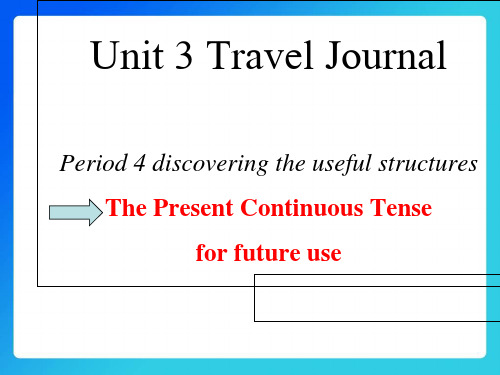
I’m leaving tomorrow. He is coming back this Sunday. How are you getting there?
表达将来旳时态还有下列措施:
① will/shall+动词原形,表达将来某个时间要发生旳 动作或存在旳状态;或表达自然趋势或非主观意志 。 e.g. He will write you a letter next week. I shall be sixteen years old next month.
A. is hanging B. has hung
C. hangs
D. hung
7. ---What’s that terrible noise? ---The neighbours __B__ for a party. A. have prepared B. are preparing C. prepare D. will prepare
17. --Do you think we should accept that offer?
--Yes, we should, for we _A__ such bad luck up till now, and time ___ out. (2023江西) A. have had; is running B. had; is running C. have; has been run D. have had; has been run
---You can when you _A__ a bit old.
A. get
B. will get
C. are getting D. will have got
七年级英语下人教版unit3“一般将来时”的几种语法形式

“一般将来时”的几种语法形式初中英语中暗示一般将来时的语法形式有四种:shall/will+动词原形;be going to +动词原形;现在进行时和一般现在时。
现将这四种形式分述如下:一. shall/will+动词原形1. will可用于所有人称,但shall 仅暗示单纯将来时,用于第一人称I和we,作为will的一种替代形式。
以You and I为主语时凡是避免用shall。
例如:He will be back soon. 他很快就会回来。
I shall/will be free on Sunday. 星期天我有空。
You and I will work in the same factory. 你和我将在同一工厂工作。
2. will , shall可用来预言将来发生的事。
如说出我们设想会发生的事,或者请对方预言将要发生什么事。
例如:It will rain tomorrow. 明天将要下雨。
3. will , shall除可暗示单纯的将来时以外,还可以带有意愿的色彩,仍指的是将来。
例如:I’ll buy you a bicycle for your birthday. 你过生日时,我给你买一辆自行车。
(暗示允诺)Will you open the door for me please? 请你帮我开门好吗?(暗示请求)Shall I get your coat for you? 我可感觉你拿外套吗?(暗示提议)二. be going to+动词原形1. 暗示说话人按照现在已有的迹象,判断将要或即将发生某种情况。
这类句子的主语可以是人,也可是物。
例如:There is going to be a football match in our school tomorrow afternoon. 明天下午我们学校将有一场足球赛。
(已有告示)I feel terrible . I think I’m going to die. 我感应难受极了,我想我快不行了。
人教版高一英语必修一-Unit3-现在进行时表将来 (1)

• 1. The summer holiday _is_c_o_m_i_n_g_ (come). My classmates and I are talking about what to do during the holiday.
• 2. Now Ia_m__le_a_v_in_g(leave) home for college. At last, I will be on my own, but I still want to have my parents to turn to whenever I need help.
Look at the dark clouds, there is going to be a Байду номын сангаасtorm.
3. be to do (按计划安排)打算,将要 做, 表目的,表示说话人的意志、意 图、职责、命令、义务。
1. The meeting wisiltlotatkaekpelapcleace
常用句型: be about to do......when...... 正要做......突然这时......
I was about ________(leave) the office ________ the telephone rang.
注意
summary
1. It is reported that many a new house is being built at present in the
disaster area.(build) 据报道,目前在这个受灾地区正在建很多房 子。
2.If you find you are being followed, you’d better go where there are many people.(follow) 如果发现有人跟踪你,你最好去人多的地方。
Book 1 Unit 3 Grammar 现在进行时表示将来

Book 1 Unit 3 Grammar 现在进行时表示将来现在进行时的构成:肯定式:主语+ be(is/am/are)+ v-ing否定式:主语+ be(is/am/are)+ not + 现在分词一般疑问式:be(is/am/are)+ 主语+ 现在分词特殊疑问句:特殊疑问词+ be + 主语+ 现在分词?用法:1. 表示说话时正在进行的动作或状态。
Dad is writing an e-mail now. 爸爸正在写电子邮件。
Look! What are they watching? 看,他们正在看什么?2. 表示现阶段正在进行的动作,虽然此刻动作不一定正在进行。
I am working on a new book about stories in schools. 我正在写一本关于校园故事的书。
So far as I know, they are studying in the same school. 就我所知,他们在同一所学校上学。
3. 表示按计划或安排在不久的将来要做或者预定要做的事情。
这种结构中常用表示方位移动的动词。
如arrive, leave, travel, start, move, come, go, fly 等。
The train is arriving in 5 minutes. 火车将在五分钟后到达。
What time is the plane taking off? 飞机将在什么时候起飞?Tom is coming here next week.汤姆下周要来这儿。
4. 现在进行时与副词always, constantly, forever等连用,强调不断重复,表示赞成、厌烦、生气、埋怨等语气。
He is always changing his mind. 他总是改变主意。
He is forever thinking of others. 他永远都为别人着想。
5. 以下几种表达方式也可以表示将来含义:1) will/shall do表达单纯将来,可用于说话时才想到或决定的事。
人教版英语必修一Unit 3(现在进行时表将来)(共24张PPT)
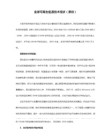
Wang Jun
延伸拓展:除be doing外,还可用什么形式表示将来的动作或状态?
Group work:找出句中表示将来时的几种形式
Last Wednesday, our German friends left our school. They were going to visit Suzhou and Beijing in the following days. Yesterday, I was about to go to school when one of my German friends phoned me and told me what he saw in Beijing.
G:Great!
动词: do/ see…off/ leave for/ stay/ play/ meet/…
summary
1. 现在进行时还可用来表示一个在最近按 _计__划____或__安__排___打算要进行的动作;
2. 通常带一个表示__将__来___的时间状语, 但有 明确的上下文时也可省略时间状语。
I know their plane takes off at 10:00 this Wednesday morning. If I go to Germany next time, I will visit him again. Our friendship is tong & fill in the blanks Lemon Tree
Task 1— enjoy a song & fill in the blanks I ____ _______ here in a boring room. It's just another rainy Sunday afternoon. I ____ _________ my time, I got nothing to do. I ____ _________ around, I ______ ________for you. But nothing ever happens, and I wonder.
北京四中高中英语(新人教版必修1...

Unit 3语法现在进行时表将来概念引入:(1) I’m going. 我要走了。
(2) What are you doing next Sunday? 下星期你打算干什么?(3) Don’t forget: you are taking part too.不要忘记:你也要参加。
(4) She is going to the dentist tomorrow because she is having a tooth filled.她明天要去看牙医,因为她的牙需要补。
语法讲解【高清课程unit3 语法】一位新闻记者正在采访Wang Wei关于她的湄公河之旅的计划。
请观察下面的一些采访内容:1. I hear that you are traveling along the Mekong River.2. So when are you leaving?3. How far are you cycling each day?4. We are taking a large parcel of warm clothes with us.5. Where are you staying at night?现在进行时表将来1. 现在进行时表示将来主要用于表示按照计划或安排将要发生的动作或事件,常表示最近或较近的将来,有“意图”、“安排”或“打算”,给人期待感,多是转移动词,如:come, go, start, arrive, leave, stay等。
I’m leaving tomorrow.我打算明天离开。
Are you staying here till next week? 你要在这儿待到下个星期吗?They’re coming here this afternoon.今天下午他们要来这儿。
She is leaving on the New York flight.她要乘飞纽约的航班去。
Do you know if he is going to school tomorrow? 你知道明天他上不上学吗?What time are you coming back? 你准备什么时候回来?I am starting early tomorrow morning. 我打算明天一早就动身。
- 1、下载文档前请自行甄别文档内容的完整性,平台不提供额外的编辑、内容补充、找答案等附加服务。
- 2、"仅部分预览"的文档,不可在线预览部分如存在完整性等问题,可反馈申请退款(可完整预览的文档不适用该条件!)。
- 3、如文档侵犯您的权益,请联系客服反馈,我们会尽快为您处理(人工客服工作时间:9:00-18:30)。
--- Oh, no, I forgot. I ____ her now.
A. will be calling
B. will call
C. call D. am to call
13. ----Have you moved into the new house? ----Not yet. The rooms___. A. are being painting B. are painting C. are painted D. are being painted
4. 表示反复性或习惯性的动作,常与always,
continually等连用,表示说话人的赞扬、厌恶、
不满和遗憾等感情色彩。
She is always changing her mind.
她老是改变注意。(指责)
She is always thinking about others first.
练一练!
1.---Did you write to Grace last summer?
---No, but I'll ______ her over
Christmas vacation.
A. be seen
C. be seeing
B. have seen
D. to see
2. ---I’m going to the States? ---How long ___ you___ in the States? A. are; stayed B. are; staying C. have; stayed D. did; stay 3. I’ve won a holiday for two weeks to Florida. I ____ my mum. A. am taking B. have taken C. take D. will have taken
T-shirts are sold at half prices.
A.has closed down
B. closed down
C. is closing down D. had closed down
9. --- Can I join the club, Dad? --- You can when you ___ a bit old. A. get B. will get C. are getting D. will have got 10. I feel it is your husband who ___ for the spoiled child. A. is to blame B. is going to blame C. is to be blamed D. should blame
shouted at me and told me not to do so.
我正要去游泳, 这时向导大声叫我不要去。
一般现在时表示将来时
(1) 客观性较强,多指按时刻表或规定要进行的动作。仅 限于动词leave, start, arrive, go等动词. The plane takes off at 10:10. That is, it’s leaving in ten minutes. (2) 用在状语从句中用一般现在时代替将来时。 If you do that again, I’ll hit you. (3) 用在I bet 和I hope后面, 常用一般现在时表将来。 I bet you don’t get up before ten tomorrow. 。 (4) 在以here和there引起的句子中,常用一般现在时代替 将来时。 Here comes the teacher.
4. Selecting a mobile phone for
personal use is no easy task because
technology ____ so rapidly.
A. will change
B. has changed
C. will have changed
D. is changing
We are leaving for Shanghai next week. 2)用于某些非位移动词,如:do, buy , meet, have, play, publish 等。一般句中有时间状语。 I am publishing a book this year. 3)现在进行时表示现阶段正在进行的动作或所处的状态, 而说话是不一定在进行。 She is writing the novel this year. I am working in an insurance company now.
14. ---- Do you like the material? ---- Yes, it ____ very soft. A. is feeling B. felt C. feels D. is felt
15. I don’t really work here; I ___until the new secretary arrives. A. just help out B. have just helped out C. am just helping out D. will just help out
5. --- You’ve left the light on. ---Oh, I have. ___ and turn it off. A. I go B. I’ve gone C. I’ll go D. I’m going 6. --- Is this raincoat yours? ---No, mine____ there behind the door. A. is hanging B. has hung C. hangs D. hung
现在进行时表将来
Grammar
用现在进行时表示将来 当句子涉及确切的计划、明确的意图 和为将来安排好的活动时, 现在进行 时可用于表示将来。
1) 表示按计划或安排最近将要进行的动作。多是一些表 示位移的动词:come, go, stay, arrive, leave start,stay, return, travel ,meet, see, work等。
③ be to+动词原形:表示按计划要发生的事 或命令,指责,义务,可能性等。 I am to see him today at six o’clock. ④ be about to+动词原形,表示即将发生的 动作,不与表示将来的时间状语连用。 I was about to go swimming when my guide
11. At this time tomorrow, ____
over the Atlantic.
A. we’re going to fly
B. we’ll be flying
C. we’ll fly
D. we’re to fly
12. ---Did you tell Julia about the result?
7. --- What’s that terrible noise?
---The neighbours____ for a party.
A. have prepared
B. are preparing
C. prepare
D. will prepare
8. Because the shop ____, all the
她总是先想到别人。(赞扬)
注意!
另外,表示将来的动作或状态,还可用以 下几种形式: ① will / shall+动词原形 I shall be seventeen years old next month. ② be going to+动词原形:表示即将发生的 或最近打算进行的事。 We are going to have a meeting today.
